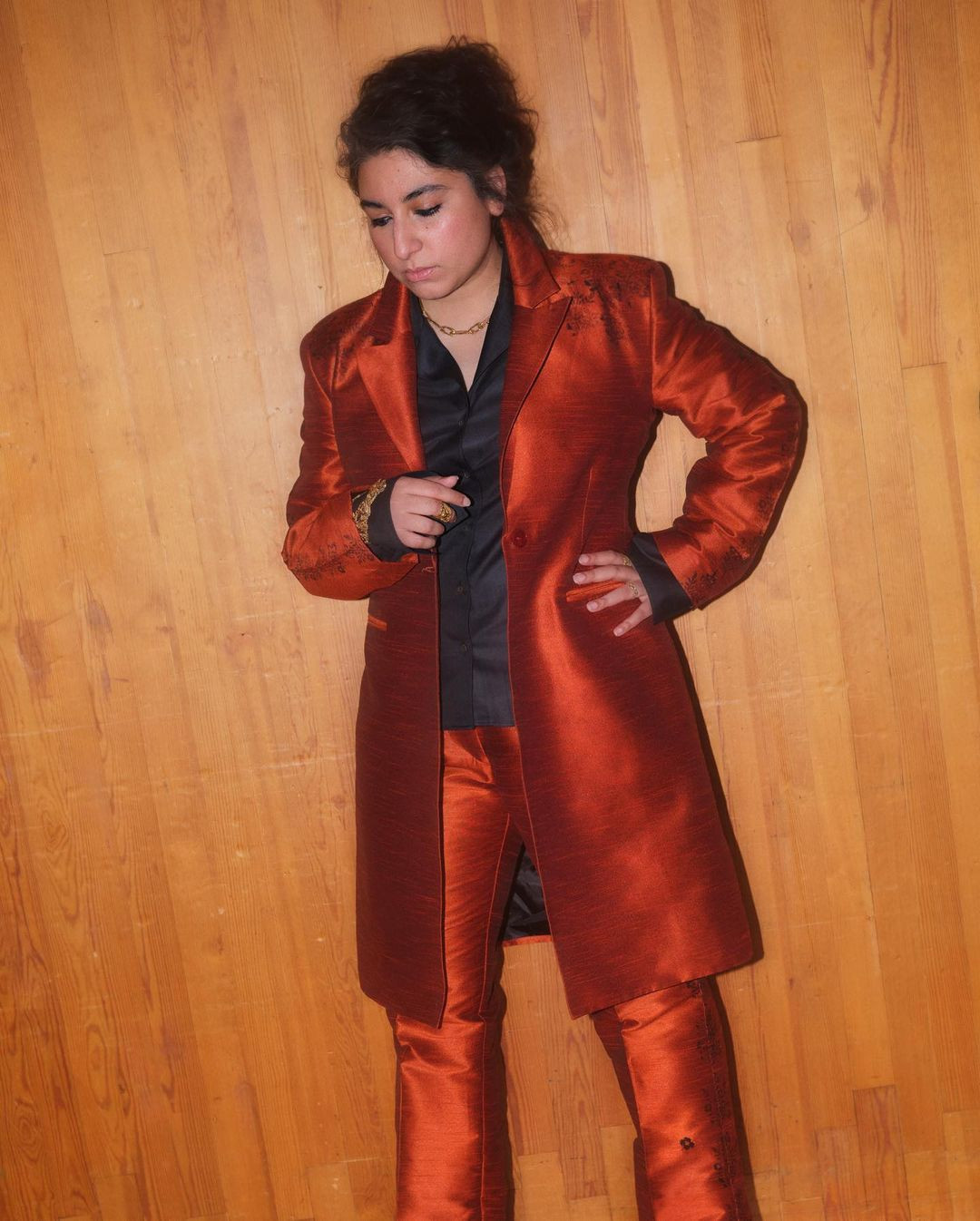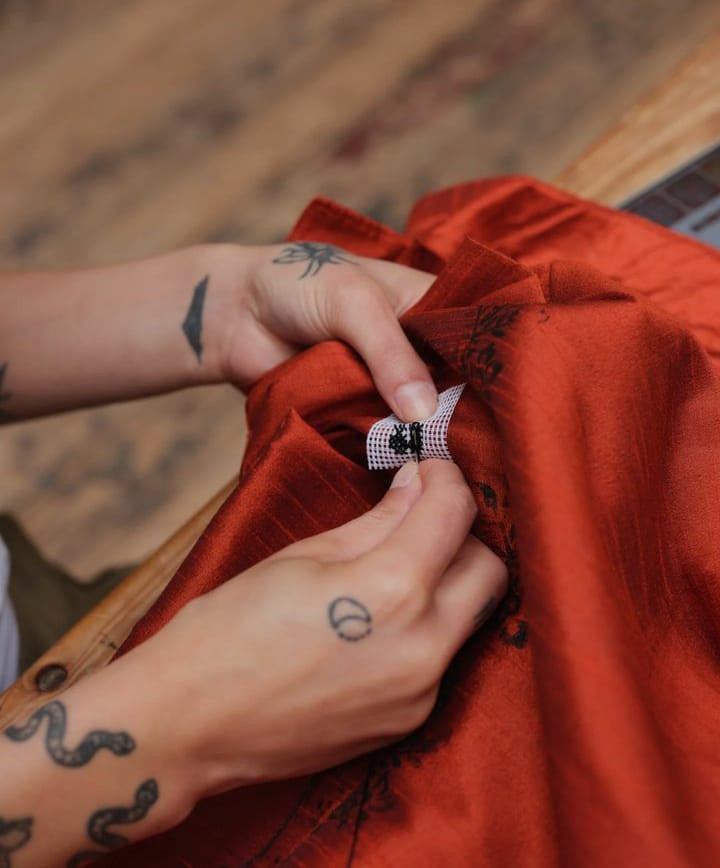1686725872-0/WhatsApp-Image-2023-06-14-at-11-56-50-AM-(1)1686725872-0.jpeg)
Pakistani-American singer Arooj Aftab, currently on tour for her album Love in Exile, gave a nod to Palestinian history at a live performance in London. The Grammy winner said she’s all about making her live performances reflect her music and values.
For her London performance at the Barbican Hall on June 2, Aftab found the perfect collaborator in Yasmeen Mjalli, the founder and creative director of Nöl Collective, an intersectional fashion house based in the Palestinian territories. The final ensemble, a rusted amber silk suit, showcased Pakistani and Palestinian elements.
The jacket featured intricate tatreez embroidery along the lapels, cuffs, and hem, depicting motifs inspired by both cultures. The embroidery told a story of resilience and shared heritage, intertwining the narratives of Aftab and the Palestinian people. Complementing the jacket, Aftab wore matching high-waisted silk trousers adorned with delicate gold threadwork, reminiscent of traditional Pakistani craftsmanship.

Aftab took to Instagram to share a picture of her outfit and pen a note about this special collaboration. “This collaboration is so close to my broken little heart. Yasmeen Mjalli of Nöl Collective created this fire outfit with the troubling history and sorrow of a land so precious deeply woven into a raw silk fabric, in a colour of resistance and hope,” she wrote. “I wore it in London on stage performing Love In Exile. I will hold our shades of pain in power until we see the world change.”
The Mohabbat singer’s journey with Nöl Collective began when her manager gifted her a Nöl blazer adorned with a Palestinian children's poem embroidered on the back, which she wore during her debut NPR Tiny Desk concert in December 2021. The video caught the attention of Mjalli, and soon the two artists collaborated for Aftab's 2023 international tour.
“When I started thinking about what I wanted to create for Arooj, I was drawn to how effortlessly she embraces strong, powerful looks. She wears blazers and capes with big shoulders and is commanding in her aesthetic,” Mjalli told Vogue. “I wanted to emulate that in this piece for Barbican and her tour and give her a powerful presence on stage.”
When asked about the significance of her collaboration with Nöl Collective, Aftab told the publication how she “absolutely admires” the fashion house's dedication to sustainability and cultural preservation. “I like to be styled with a sense of royalty,” Aftab said. “It’s influenced by my album Vulture Prince, but it’s also a style that preserves the feminine in some ways and in other ways, embodies a person who is brave. I can see it in angles and big shoulders and straight lines. The flowy sh*t doesn’t really work for me and Yasmeen totally got that.”

All of Mjalli’s suits and blazers are made in the Askar refugee camp. “I’m really proud to wear garments made by people in Palestinian refugee camps. Oftentimes, there’s really such little hope, and you’re just confused as to what you can do that will actually mean something…putting on these clothes is a powerful symbol of support and adds a new dimension to my performance,” Aftab said.
With a hyper-focus on slow fashion, Mjalli felt a deep need to be involved in every step of the garment production process, employing Palestinian craftspeople and reviving ancestral techniques such as tatreez, a laborious cross-stitch embroidery traditionally passed down from mother to daughter. “For centuries before Palestine was colonised, you could look at a woman and by the motifs, colours and tatreez on her dress, you could tell exactly where she was from because the design was so hyper-specific to her village or region. It was almost like a visual autobiography,” Mjalli explained.

However, after the Palestinian Nakba in 1948, Mjalli shared that tatreez took on an even deeper meaning. “It was then when Palestinians were uprooted, and their villages were destroyed. The memory of villages was kept alive through embroidery and dresses that would be passed down,” she said. “These women’s clothes really became maps of their own, a reminder of what Palestine once was.”
However, living under Israeli occupation presents challenges for Nöl Collective's operations. The restricted movement of people and goods among Palestinian territories makes shipping and transportation a constant hurdle. Despite facing detentions and delays at checkpoints, Mjalli perseveres, sometimes personally driving for hours to move her textiles between locations, reported the publication.
The creation of Aftab's stage ensemble faced its own obstacles. Mjalli's package containing the tailored suit was unexpectedly blocked by the Tel Aviv post office, jeopardising the timely delivery. But Mjalli did not lose hope and rerouted the package through Jordan and Saudi Arabia to ensure it reached London in time for Aftab's performance.
Have something to add to the story? Share it in the comments below.




1732003896-0/Zendaya-(1)1732003896-0-165x106.webp)

1729930993-0/WhatsApp-Image-2024-10-26-at-08-52-06-(2)1729930993-0-270x192.webp)










COMMENTS
Comments are moderated and generally will be posted if they are on-topic and not abusive.
For more information, please see our Comments FAQ